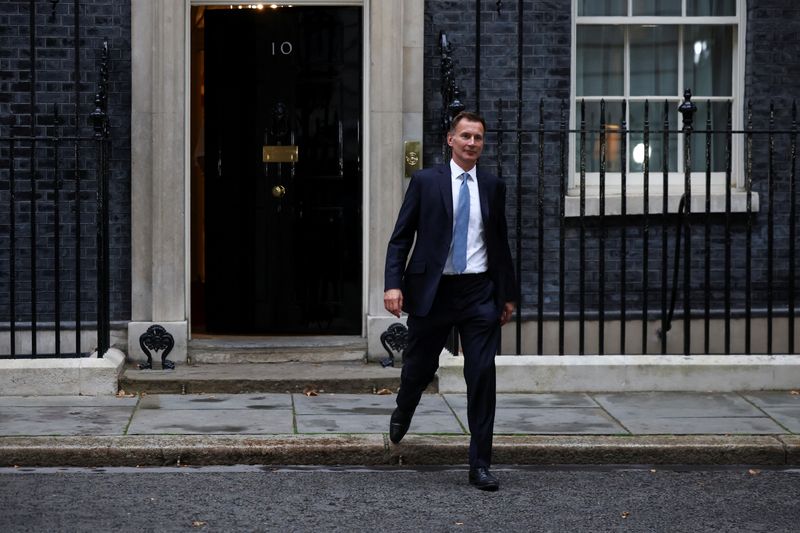Gold prices set for weekly gains on dovish Fed outlook; silver near record high
By William Schomberg and Sachin Ravikumar
LONDON (Reuters) - Britain recorded a smaller-than-expected budget deficit in July, official data showed on Tuesday, giving finance minister Jeremy Hunt a bit of hope that he can cut taxes later this year, before an election expected in 2024.
Some economists warned, however, that an economic slowdown or a recession in the coming months, as the Bank of England keeps on raising interest rates to fight high inflation, could deny Hunt the room for manoeuvre for pre-election giveaways.
Net borrowing, excluding state-owned banks, stood at 4.3 billion pounds ($5.49 billion) last month, less than the median forecast of 5.0 billion pounds in a Reuters poll of economists.
In the first four months of the financial year, borrowing stood at 56.6 billion pounds.
That was almost 14 billion pounds more than the same period last year but 11.3 billion less than forecast by the Office for Budget Responsibility (OBR) whose projections underpin the government's fiscal plans.
Hunt and Prime Minister Rishi Sunak have so far resisted pressure from lawmakers within their Conservative Party to cut taxes and boost their chances in the election which opinion polls suggest they will lose.
"As inflation slows, it's vital that we don’t alter our course and continue to act responsibly with the public finances," Hunt said in a statement after the data.
"Only by sticking to our plan will we halve inflation, grow the economy and reduce debt."
Hunt has kept a tight grip on the public finances since he took over at the Treasury late last year after turmoil in financial markets caused by former Prime Minister Liz Truss's unfunded tax cut plans.
Ruth Gregory, Deputy Chief UK Economist at consultancy Capital Economics, said Hunt should remain cautious about the outlook for the public finances with interest rates still rising and a mild recession apparently on its way.
"As a result, we still think the Chancellor will have little room to unveil large-scale permanent tax cuts and/or spending rises in the Autumn Statement without jeopardising his fiscal rules," Gregory said.
Gabriella Dickens, Senior UK Economist at Pantheon Macroeconomics, said a likely increase in the OBR's projections for debt spending, after the BoE's run of interest rate increases, was likely to reduce any wiggle room for Hunt.
The Office for National Statistics said public debt stood at 2.579 trillion pounds or roughly 98.5% of gross domestic product, up almost 2 percentage points from a year earlier and holding at high levels last seen in the 1960s.
Interest costs rose by 1.5 billion pounds compared with July last year to 7.7 billion pounds, the highest for July since records began in April 1997. But a recent easing of Britain's high inflation - which adds to payouts for holders of inflation-linked bonds - should ease that burden soon, the office said.
The public finances were boosted by inflows of self-assessed income tax receipts which are typically strong in July, which stood at 11.8 billion pounds, 2.5 billion pounds more than in July last year.
Borrowing by Britain's government soared during the COVID-19 pandemic and was pushed up further by last year's energy price surge which prompted the government to spend around 40 billion pounds in subsidies for households and businesses.
($1 = 0.7831 pounds) (This story has been corrected to change the public debt figure to 2.579 trillion, not billion, in paragraph 13)
